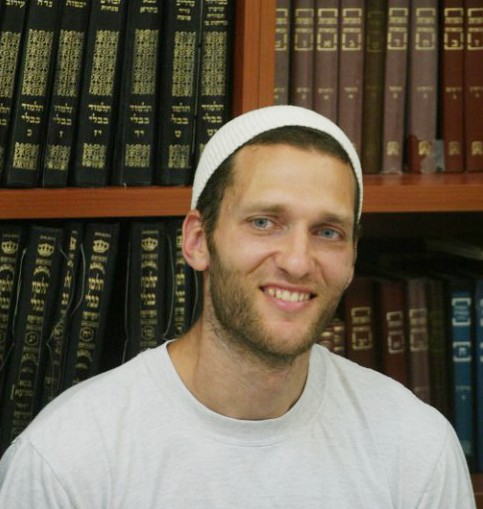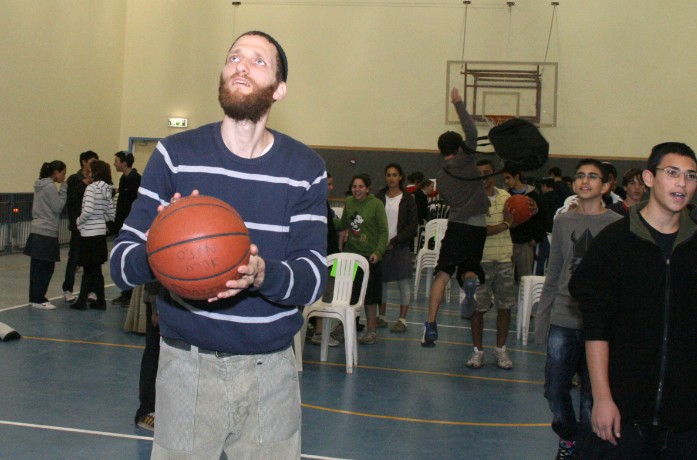Doron Sheffer: "The Journey to Infinity Never Ends"
Two years after publishing 'Anani', Doron Sheffer is working on a new book. He says the trials and challenges continue even after entering the world of Torah.

Two years have passed since the publication of "Anani", the personal story of former basketball player Doron Sheffer. In English, this is called a biography. However, even during the writing phase, Doron felt differently: "My heart tells me that my story extends beyond a limited personal scope, and therefore I feel a kind of responsibility and duty to share it with everyone open to hearing it. I don't pretend to change the readers' lifestyles. The story will be told, and if it improves even a bit the life of one person, one reader, that would be enough for me" (from the introduction to the book "Anani").
Doron's heart was right. The verse says "From the narrow place I called Hashem, Hashem answered me with expansiveness," and indeed, "Anani" quickly moved from the confines of a personal story to the general arena. "I received many responses from a wide variety of people, many of whom repeatedly said one thing: 'I feel as if the book was written about me, as if I wrote it'. These responses strengthened my feeling that even though it's a very personal life story that passes through basketball courts, cancer struggles, a journey to India, and drawing closer to the world of Torah – the heart of it, the root of the story, touches everyone," says Doron.
 Doron Sheffer (Photo: Orel Cohen / Flash 90)
Doron Sheffer (Photo: Orel Cohen / Flash 90)These days, Sheffer is working on completing a sequel to "Anani". Not long ago, he reached out to the public for support to publish the new book through the crowdfunding site 'Headstart', where readers participate not only as consumers who buy the book once it's on the shelf, but already in the creation phase. This method allows the creator to keep 100% of the purchase fees and offers the buyer a lower price in exchange, "of course, with thanks and a personal dedication," promises Sheffer.
From the conversation with Sheffer, it's clear he's learned a lot since "Anani" was published. The return to Judaism and the initial discovery of Jewish life is one thing, and the continuity and perseverance in the world of Torah and mitzvot are something entirely different. A first Seder night as per halacha is not the same as a tenth one with young children and matzah crumbs, and not just with "lights" and excitement. A first Shabbat kept with bright eyes differs from a seemingly routine Shabbat after the novelty fades. Sheffer is aware of this process and wants to share the experience he's gained. In Judaism, the return never really ends; it's a journey, a prolonged process, and Sheffer wants to equip readers with insights he gathered during the second phase of the journey.
What was not told in "Anani" that led you to write another book?
"The book 'Anani' brought me to the point of entering the world of Torah at the age of 34. Although not many years have passed since then, many waters have flowed in the river of my life. Many stories and trials. I tell how I transformed from a competitive basketball player to using basketball as an educational and therapeutic tool. How the cancer struggle gave birth to "Hiyuli," which my wife, Talia, and I founded in Moshav Amirim. About the life-giving force in the Torah, the deathly force within it, and the challenges, blessings, and upheavals it brings to life."
Today, Doron operates "Hiyuli" with his wife, Talia – a place for hosting, treatments, and workshops where they provide personal coaching, tools, and practical advice for healthier, happier, and more balanced living. "The place was inspired by the illness and especially by the way I coped with it. My wife and I focus on and treat the root causes of illnesses and problems, not just the symptoms. It's clear and simple that if a person had a tumor and removed it but didn't address the unhealthy causes and habits that led to the illness, it is likely the tumor will return. These are not just unwholesome eating habits but also stresses, pressures, fears, and physical and mental burdens that can cause illnesses. There is also the spiritual level connected, among other things, to faith and trust. During hostings at our place, we provide guests with good food for the body, the mind, and the soul."

Why Amirim? Didn't you seek a religious place?
"First of all, I embrace the words of the Lubavitcher Rebbe that "there are no religious or secular people – we are all Jews." There are many Jews in Amirim.
In the settlement, there is a community of about 15-20 families defined as Torah and mitzvot observant, with whom we naturally have much in common. Over the years, we learn and experience that "your people are all righteous". We gain the chance to learn and teach, give and receive, even from residents not defined as religious. Additionally, the mountain air, nature, and open spaces benefit us, and we also connect with vegetarianism. Unlike living in a religious settlement where there is a risk of falling into "mechanical religious observance," the fact that Amirim and most of its residents are not defined as religious highlights our distinct flavor and forces us even more to refine our place in the settlement and beyond. There are many trials and challenges that lead us to do repentance upon repentance. In the Hasidic teachings, they say "the journey to infinity has no end" and that's what's beautiful and fascinating about Hashem's world. Being on an endless journey enhances the importance of being content with our portion, even the hard and lacking part."
Do you follow Israeli basketball today?
"I glance from afar. For me today, basketball is mainly an educational and therapeutic tool through which I reach the hearts of children, teens, and adults. I conduct workshops titled "Basketball with Derech Eretz" where I compare basketball to the game of life and try to give them advice and tools for healthier, happier, and more balanced living. A kind of assist off the court in the hope that it will be a blessing and benefit. Paradoxically, today I love the game more than ever because I encounter it from a much purer place. No cameras. No scores. Pure game. I call it "Ball Therapy".
The Gemara says about a convert, that for ten generations one should not mention an Aramean in front of him derogatorily. On a different note, I'm interested in how it feels for a former basketball player. For the first time in many years, Maccabi Tel Aviv, your former team, didn’t make it to the league finals. Did it affect you?
"Even though in recent years I'm less present in basketball halls and dislike the pursuit of victories and subjugation to the success idol, the people from basketball are a dear and beloved family to me. It is said, "may sins vanish from the earth," and the Gemara in Berachot emphasizes that it's the "sinners" that should vanish and not the "sinners" themselves. I was informed about Maccabi's loss of the championship and what I did was reach out to the team's coach, Guy Goodes, to strengthen him and ensure he's well."
 (Photo: Gershon Elinson / Flash 90)
(Photo: Gershon Elinson / Flash 90)Recently, there is much discussion about the challenge Sabbath-observing athletes face in participating in games and practices. Having undergone a difficult process yourself, what tip can you give to a player today who feels torn between the court and the Creator of the world?
"In recent years, many children and parents have approached me with questions about combining the world of Torah and competitive sports. I first tell them that it is possible. This is what I did when I played my last year in Galilee. It's not easy and very challenging. Of course, the understanding and cooperation of the coach regarding observing Shabbat and holidays are required. But what's more important to me is to enlighten and awaken in those children and parents questions about what truly attracts and drives them to delve into competitive sports? What is their real goal in the endeavor? Is the pursuit of money, fame, and honor what drives them? Is it truly their dream and purpose or someone else's? I want to remind them that good manners precede not only Torah but also victories and trophies. Even if their choice is to delve into competitive sports, it's important they don't lose the way in it. The way of good manners and virtues. The word victory comes from the root N.Tz.Ch. The sages remind us what remains forever are our good deeds."
Watch an interview with Doron and Talia Sheffer, from "In Another Direction":

